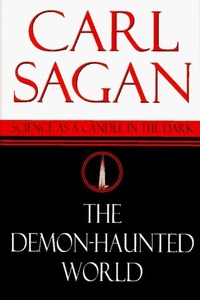Take a photo of a barcode or cover
informative
reflective
slow-paced
informative
inspiring
lighthearted
reflective
relaxing
fast-paced
A must-read book, in my opinion. Very easy to read, very informative, written in a way that makes you eager for more. This is a book for everyone, but mostly for those who need to develop critical thinking.
reflective
medium-paced
Carl’s entreaty to us all to exercise critical thinking and scientific methods in our day to day. He analyzes many pseudo-scientific theories (crop circles/astrology/ghosts) against the backdrop of scientific method. This book is deeply eye-opening, especially about how pseudo-scientific thought-leaders manipulate the vulnerable populace creating dangerous situations, from the witch hunts (property theft and murder of women) of the 17th century to modern-day charlatans like Graham Hancock. After reading this book I didn’t mention astrology for a whole month! Alas, astrology is a hard one to kick but I truly enjoy Carl Sagan washing my brain for a while.
Oof. I did not have a good time with this one. It's a collection of essays, all of which seem to have been previously published elsewhere. I'm not sure why this book doesn't indicate that it's actually a collection of Sagan's writings, all somewhat on a similar theme.
Fully half of this book (the front half) is about aliens and alien abductions. The second half provides a bit more variety, but is largely about how the US doesn't respect science enough or needs to protect the scientific method.
I think his main point is valid (science matters?), but wow, I did not need 400 pages on it. It felt so repetitive. The book reminds me a little of another book I read called Capitalism & Disability, which is also a collection of essays. *However* the editor of that book actually cut sections from different essays where the same point would have been repeated. I wish this collection had used a similar approach instead of choosing to be exhaustive.
Sagan is a big fan of the scientific method, and I am a fan as well, but I don't think he offers enough criticism of it. Especially after reading essay after essay of praise. There is one essay (I don't remember the name) that nods to the knowledge that other people come to without using the "scientific method" as such. For example, there are peoples in the past who have learned things about plants through trial and error that are passed down. But besides that, he doesn't ever acknowledge that the scientific method is still a human-created thing that is our best effort. It's not infallible, and the world of science is not without it's problems with biases. At one point he says how scientific fields used to exclude women, and he implies that it's no longer a problem... and this book is from the 90s. Also, oddly in the same book in which he praises the scientific method, he brings up a remarkable amount of anecdotes to defend his positions.
I'm not at all sure who the audience for this was. If you agree with him, it's boring because he's trying to convince you of things you already think rather than really adding any new insights (or so I felt). If you don't agree with him, I don't think you're picking this up, and I don't think his arguments will win you over.
Fully half of this book (the front half) is about aliens and alien abductions. The second half provides a bit more variety, but is largely about how the US doesn't respect science enough or needs to protect the scientific method.
I think his main point is valid (science matters?), but wow, I did not need 400 pages on it. It felt so repetitive. The book reminds me a little of another book I read called Capitalism & Disability, which is also a collection of essays. *However* the editor of that book actually cut sections from different essays where the same point would have been repeated. I wish this collection had used a similar approach instead of choosing to be exhaustive.
Sagan is a big fan of the scientific method, and I am a fan as well, but I don't think he offers enough criticism of it. Especially after reading essay after essay of praise. There is one essay (I don't remember the name) that nods to the knowledge that other people come to without using the "scientific method" as such. For example, there are peoples in the past who have learned things about plants through trial and error that are passed down. But besides that, he doesn't ever acknowledge that the scientific method is still a human-created thing that is our best effort. It's not infallible, and the world of science is not without it's problems with biases. At one point he says how scientific fields used to exclude women, and he implies that it's no longer a problem... and this book is from the 90s. Also, oddly in the same book in which he praises the scientific method, he brings up a remarkable amount of anecdotes to defend his positions.
I'm not at all sure who the audience for this was. If you agree with him, it's boring because he's trying to convince you of things you already think rather than really adding any new insights (or so I felt). If you don't agree with him, I don't think you're picking this up, and I don't think his arguments will win you over.
challenging
hopeful
informative
medium-paced
reflective
medium-paced
Quite a few of the essays in the book are products of their time in the 1980s and '90s. The last 40% or so of the book is more relevant to today than some of the earlier part.
informative
reflective
medium-paced
informative
reflective
medium-paced
informative
reflective
slow-paced






